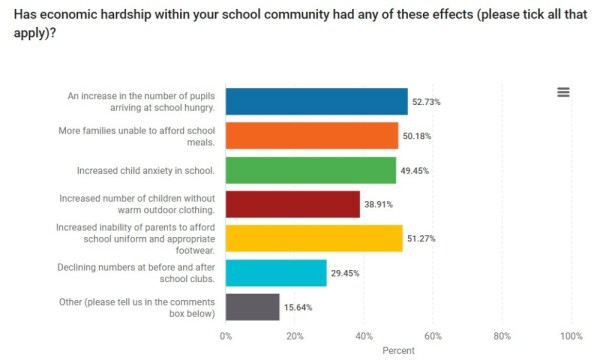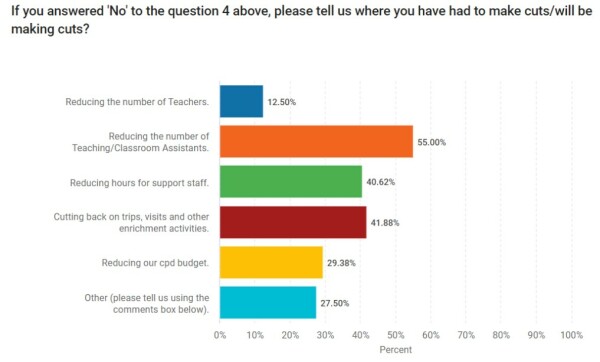Cost-of-living crisis in our schools: your views

 Tuesday 28 February was National School Governors’ Awareness Day and, in addition to celebrating and promoting school governance with our key partners, our theme this year was the impact of the cost-of-living crisis on our schools.
Tuesday 28 February was National School Governors’ Awareness Day and, in addition to celebrating and promoting school governance with our key partners, our theme this year was the impact of the cost-of-living crisis on our schools.
At Strictly Education, we carried out research in the run up to the event amongst serving governors and trustees to explore the impact of economic hardship on school communities - and the extent to which this was an area of focus for boards.
91.3% of respondents confirmed that their board had already discussed the cost-of-living crisis this academic year, but what took us aback was the detailed information that we received from over 300 governors and trustees who responded.
We asked what impact those in governance had already witnessed in their schools and the table below provides some valuable insights.

Just over half of respondents reported an increase in children and young people arriving at school hungry and a similar proportion reported that more families in their community are unable to afford school uniform or appropriate footwear.
This paints a disturbing picture of our schools in 2023 and yet when we asked governors and trustees to share other impacts it was just as concerning. Respondents said parents were asking to give their children leftover food and others reported a need for new facilities such as a ‘community shed’ to provide food and other household items. We also received comments about a reduction in parents and carers being able to make voluntary contributions to school trips.
Additional measures
We asked governors and trustees what additional measures schools had put in place to support families adversely impacted by the economic crisis. 57% of all respondents said their schools have implemented additional support. A key theme of the responses related to food, with schools; providing free breakfasts, requesting breakfast cereal donations and operating ‘food share points’ (Bring what you can, take what you need). High numbers of schools were also reporting having created coat banks/exchanges and pre-loved uniform exchanges. Several governors also shared that their schools had reviewed their uniform policy as a means of reducing its cost.
Many were reporting increased demand for Mental Health First Aiders due to growing numbers of children and young people with heightened levels of anxiety, often resulting in poor attendance. Issues of pupil anxiety are of course placing increased pressure on support services, funded by our schools at a time when such funding is also under pressure.
We took the opportunity to ask those involved in school governance if their school or trust was able to balance their budget for the next fiscal year. Just over 50% responded that they could not balance their budget. We know that headteacher associations are also reporting large numbers of schools with huge challenges in balancing and we asked which areas of the budget schools were looking to make cuts. This chart shows the key areas:

We received a huge number of comments to accompany this question and whilst some governors and trustees are able to use existing reserves to offset in-year deficits many were faced with some difficult challenges and made the point that cuts in funding from government are forcing them to cut aspects of the schools’ work which will impact most on already disadvantaged pupils. Typical strategies to reduce costs are: cutting the numbers of support staff; reducing non-contact time for teachers; cutting pastoral teams (counselling, nurture groups, etc); asking parents to provide consumables such as paper, pencils etc and to print at home and only having school heating on for one hour each day.
Schools going above and beyond
What is clear is that many schools are seeing the cost-of-living crisis manifest itself in a wide variety of ways and whilst schools are often going above and beyond what is expected of them, many are struggling to fund the essentials, whilst facing increasing demands to support families facing severe hardship. Several governors and trustees reported that teachers, other school staff and governors are often donating food and cash to fund what they see as essential support for those most severely impacted by the cost-of-living crisis.
We always advocate to governors in our training and advice, both through Strictly Education and Better Governor, the importance of knowing the school’s context. This is more important now than ever. As context changes can occur very rapidly in times of economic hardship we fervently believe governors and trustees should be seeking to know what impact cost-of-living is having on their communities and what schools can and are doing to provide support.
Find out more
 Follow Strictly Education
Follow Strictly Education
Twitter: @strictlyed LinkedIn: Strictly Education Ltd.
 Follow Better Governor
Follow Better Governor
Twitter: @BetterGovernor LinkedIn: @BetterGovernor
Funds and freebies for your school
GovernorHub Knowledge has unlocked an article to with a selection of grants and details of freebies your school can access.

You might also like:

How to become a school governor
People are always asking me why I’m a governor. It always surprises them. Maybe it's because they don’t know what it is, or they don’t expect it coming from someone my age...

How's your board tackling disadvantage in education?
Get some free guidance and handy toolkits to help address disadvantage at your school or trust

Seven ways to become more self-aware and effective on your board
Hear from board expert Patrick Dunne on the impact of self-awareness


Post your comment
Comments
No one has commented on this page yet.
RSS feed for comments on this page | RSS feed for all comments